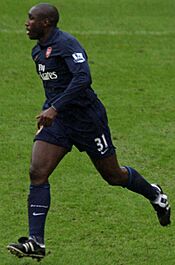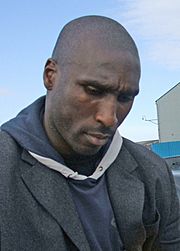Sol Campbell facts for kids
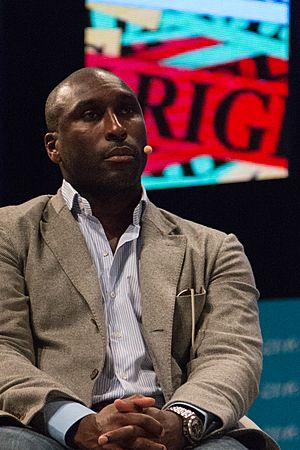
Campbell in 2014
|
|||
| Personal information | |||
|---|---|---|---|
| Full name | Sulzeer Jeremiah Campbell | ||
| Date of birth | 18 September 1974 | ||
| Place of birth | Plaistow, London, England | ||
| Height | 6 ft 2 in (1.88 m) | ||
| Position(s) | Centre-back | ||
| Youth career | |||
| 1988–1989 | West Ham United | ||
| 1989–1992 | Tottenham Hotspur | ||
| Senior career* | |||
| Years | Team | Apps | (Gls) |
| 1992–2001 | Tottenham Hotspur | 255 | (10) |
| 2001–2006 | Arsenal | 135 | (8) |
| 2006–2009 | Portsmouth | 95 | (2) |
| 2009 | Notts County | 1 | (0) |
| 2010 | Arsenal | 11 | (0) |
| 2010–2011 | Newcastle United | 7 | (0) |
| Total | 504 | (20) | |
| International career | |||
| England U15 | |||
| England U16 | |||
| England U18 | |||
| 1994–1996 | England U21 | 11 | (2) |
| 1994–2006 | England B | 2 | (0) |
| 1996–2007 | England | 73 | (1) |
| Managerial career | |||
| 2018–2019 | Macclesfield Town | ||
| 2019–2020 | Southend United | ||
| *Club domestic league appearances and goals | |||
Sulzeer Jeremiah "Sol" Campbell (born 18 September 1974) is an English football manager and former player. He is known as one of the best centre-backs of his time. Sol played for 20 years in the Premier League and spent 11 years playing for the England national team.
Campbell was born in East London to parents from Jamaica. He started his football career with Tottenham Hotspur in December 1992. He played for Spurs for nine years, scoring 10 goals in 255 games. In 1997, he became the team's captain. He led them to win the 1999 Football League Cup final against Leicester City.
In 2001, he moved to Arsenal, Tottenham's big rivals, for free. This move made him very unpopular with Spurs fans. During his five years and 195 games at Arsenal, he won two Premier League titles and three FA Cups. He was part of the famous "Invincibles" team that did not lose a single game in the 2003–04 Premier League season. He scored Arsenal's only goal in their 2–1 loss to Barcelona in the 2006 UEFA Champions League final.
In August 2006, Campbell joined Portsmouth for free. He played there for three years and was captain when they won the 2008 FA Cup final. After a short time at Notts County, he went back to Arsenal for a short contract. He then played one season for Newcastle United before retiring a year later.
After football, Campbell became an assistant manager for the Trinidad and Tobago national team. He then became the manager of Macclesfield Town, helping them avoid being moved down to a lower league. He later managed Southend United. The season ended early because of the COVID-19 pandemic, and Southend was moved down a league, leading to Campbell leaving the club.
Campbell played 73 games for England. He became England's second-youngest captain in May 1998, at 23 years old. In 2006, he became the only player to play for England in six major tournaments in a row. These included the 1996, 2000, and 2004 UEFA European Championships, and the 1998, 2002, and 2006 FIFA World Cups. He was chosen for the Team of the Tournament at the 2002 World Cup. He was also named in the PFA Team of the Year three times: in 1999, 2003, and 2004.
Contents
Early Life and Football Start
Campbell was born in Plaistow, London. His parents, Sewell and Wihelmina, were from Jamaica. He was the youngest of twelve children, with nine brothers. His father worked on the railway, and his mother worked at a Ford factory. Even though his family did not have much money, Campbell focused on football.
"I became insular because at home there was no space to grow or to evolve, everything was tight and there was no room to breathe. People don't realise how that affects you as a kid. I wasn't allowed to speak, so my expression was football."
—Campbell grew up to be quiet and polite, and football became his way to express himself.
Campbell went to Portway Primary School and Lister Community School in Plaistow. He was a very talented schoolboy player. He also trained at the FA's School of Excellence at Lilleshall. Campbell had a short time at West Ham United as a striker. He left their youth program after a misunderstanding with a coach.
Club Career Highlights
Playing for Tottenham Hotspur
After leaving West Ham, Campbell was not keen on joining another professional club's youth team. However, after two months of effort from Tottenham Hotspur's chief scout, Len Cheesewright, he joined the Tottenham Youth team. His youth team manager, Keith Waldon, noticed his strong physical presence. At 14, he was one of only 16 young players accepted into a special training program at Lilleshall Hall.
Campbell played his first game for Spurs on 5 December 1992 against Chelsea. He scored a goal in a 2–1 loss after coming on as a substitute. He did not play again that season.
New manager Osvaldo Ardiles played him at left-back and then right-back in the 1993–94 season. At the end of that season, he signed a four-year contract.
Under manager Gerry Francis, Spurs reached the FA Cup semi-finals in the 1994–95 season. Campbell missed that match due to injury. He continued to play well, and Francis made him club captain.
Campbell successfully led his team to win the League Cup in the 1998–99 season, beating Leicester City in the final. This made him the first black captain to lift a major trophy at Wembley Stadium. He was also named in the PFA Team of the Year.
Spurs played in the UEFA Cup in the 1999–2000 season but were knocked out early. Campbell felt unhappy with the club's lack of progress and support.
Campbell missed three months of the 2000–01 season due to a dislocated shoulder. His last game for Spurs was in the FA Cup semi-final loss to Arsenal.
In the summer of 2001, Campbell's contract ended. Tottenham offered him a very high-paying contract, but he decided to leave. He wanted to play UEFA Champions League football. He then made a surprising move to Arsenal, Tottenham's biggest rivals, for free. Campbell had previously said he would never play for Arsenal. This move was kept a secret until the last moment.
"[Arsenal vice-chairman] David Dein made me feel protected. He was going to help and promised to be there for me. Come to us, he said, and you will be part of our family. We will protect you."
—Campbell chose to sign for Arsenal because they offered strong support and a chance to win trophies.
Success with Arsenal
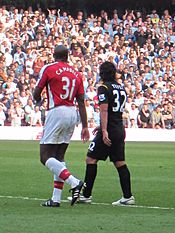
Arsène Wenger, Arsenal's manager, signed Campbell because he was a very strong defender. Campbell made his debut for Arsenal on 18 August 2001 in a 4–0 win against Middlesbrough. He quickly found success, winning both the Premier League and the FA Cup in his first season. In the FA Cup final, Arsenal beat Chelsea 2–0. Four days later, they won the league title by beating Manchester United.
In the 2002–03 season, Arsenal won the FA Cup again, beating Southampton. Campbell missed the final due to a suspension. His great performances earned him a spot on the PFA Team of the Year.
The 2003–04 season was famous for Arsenal becoming "The Invincibles". Campbell and Kolo Touré formed a strong defense, helping Arsenal win the Premier League without losing a single match. They secured the title with a 2–2 draw against Spurs. Campbell was again named in the PFA Team of the Year.
Campbell missed the start of the 2004–05 season due to a knee injury. Arsenal's unbeaten run ended at 49 matches when they lost to Manchester United. Towards the end of the season, Campbell sometimes found himself on the bench. Arsenal finished second in the league and won the FA Cup final against Manchester United, though Campbell was a substitute.
In the 2005–06 season, Campbell struggled with injuries and form. He left the stadium at half-time during a game against West Ham United. He later took a week away to think about things before returning to training.
Campbell returned to play in the UEFA Champions League semi-final against Villarreal. In the final against Barcelona, Campbell scored the first goal with a header. However, Arsenal lost 2–1. Arsenal had an amazing defensive run in that competition, not letting opponents score for 995 minutes. In July 2006, Campbell left Arsenal to find a new challenge.
Time at Portsmouth
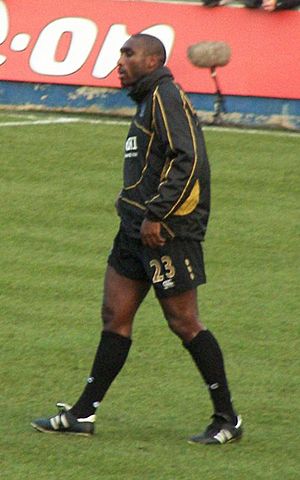
Campbell joined Portsmouth in August 2006. He quickly became a key player, helping the team keep five clean sheets in a row. He scored his first goal for the club in December.
Manager Harry Redknapp made him captain for the 2007–08 season. Campbell signed a new two-year contract. He led Portsmouth to a 1–0 win over Cardiff City in the 2008 FA Cup final at Wembley Stadium.
Portsmouth faced financial problems, but Campbell stayed and helped them avoid being moved down a league in the 2008–09 season.
"I enjoyed my spell at Portsmouth; it was like going back to a different time. Everyone was up against it, mucking in."
—Campbell enjoyed his time at the club.
Short Stint at Notts County
In August 2009, Campbell signed a five-year deal with League Two team Notts County. He believed the club's new owners had big plans. He played his first game for County on 19 September. However, he left the club three days later, and his contract was ended. He later said he felt embarrassed for believing the owners' promises.
Return to Arsenal
Campbell started training with Arsenal again in October 2009 to stay fit. On 15 January 2010, he re-signed with the club. He made his second debut for Arsenal in an FA Cup loss to Stoke City. On 18 February, he scored his first goal in his second time at the club against Porto in the UEFA Champions League. Due to injuries to other defenders, he played often for Arsenal towards the end of the season.
Playing for Newcastle United
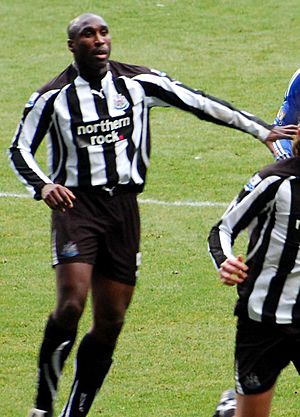
In July 2010, Campbell joined Newcastle United on a one-year contract. He played his first game for Newcastle in a League Cup win over Chelsea. On 3 October, he played his first Premier League game for the club. This made him only the second player, after Ryan Giggs, to play in the first 19 seasons of the Premier League.
In May 2011, manager Alan Pardew announced that Campbell was leaving the club as his contract was not renewed. Campbell announced his retirement from football a year later in May 2012.
International Career for England
Campbell played regularly for England's youth teams. He won two "man of the match" awards in the 1993 UEFA European Under-19 Championship, which England won.
Campbell played his first game for the senior England team on 18 May 1996. Even though he had only played one game, he was chosen for the 1996 squad.
Under manager Glenn Hoddle, Campbell became a regular defender for England. On 29 May 1998, at 23 years old, Campbell became England's second-youngest captain. He played in all four of England's games in the 1998 World Cup.
During the 1998 World Cup, Campbell scored a goal against Argentina that would have won the game, but it was disallowed by the referee. England later lost the match on penalties.
Campbell was England's main centre-back during the successful qualification for Euro 2000. He played in all three group games at the tournament.
After Tony Adams retired, Campbell played alongside Rio Ferdinand in England's successful qualification for the 2002 World Cup. He scored his only goal for England in this tournament, a header against Sweden. England then beat Argentina 1–0. Campbell was the only England player chosen for the FIFA World Cup All-Star Team. England reached the quarter-finals but lost to Brazil.
Campbell continued to play for England in the successful qualification for Euro 2004. In the quarter-finals against Portugal, Campbell scored what looked like a winning goal, but it was disallowed. England lost the game after a penalty shoot-out.
Campbell was part of England's squad for the 2006 World Cup. He came on as a substitute in a game against Sweden, making him the first player to play for England in six major international tournaments in a row. After this, new coach Steve McClaren did not pick Campbell for the team.
Campbell hoped to play in the 2010 World Cup, but he was not chosen for the squad.
Playing Style
Campbell was a strong, athletic, and powerful defender. He had a good sense of where to be on the field and was good at tackling. Because of his height and strength, he was excellent at heading the ball, both in attack and defense. He was also fast and agile. He could sometimes play as a right-back.
Managerial Career
On 30 January 2017, Campbell became the assistant manager for the Trinidad and Tobago national team.
Managing Macclesfield Town
Campbell became the manager of Macclesfield Town on 27 November 2018. The team was at the bottom of League Two. Under Campbell, Macclesfield finished 22nd in League Two, staying in the league on the last day of the season. He led the team to eight wins and 12 draws in 30 games. On 15 August 2019, Campbell left the club by agreement.
Managing Southend United
On 22 October 2019, Campbell was appointed manager of EFL League One club Southend United. Southend won their second game under Campbell on 18 January 2020, which was their first league win since September 2019. However, the season ended early in June 2020 due to the COVID-19 pandemic. Southend was in a relegation spot and was moved down to League Two. Campbell left the club on 30 June 2020.
Political Views
After retiring from football, Campbell became more involved in British politics. In 2014, he said he was thinking about joining the Conservative Party. In February 2015, he announced he wanted to run for Mayor of London in the 2016 election. However, he was not chosen as one of the final candidates.
Campbell has spoken about the lack of diversity in The Football Association ("FA"). In March 2014, he said that he was never chosen to captain the England team more often because of unfair treatment.
Personal Life
In 2008, Campbell started dating Fiona Barratt, an interior designer. They got married on 17 July 2010. He has a son from a previous relationship.
Campbell has homes in London and Northumberland.
Charitable Work
In 2009, Campbell started his charity "Kids go live". This charity helps children from inner cities go to live sporting events, like Wimbledon and the Olympic Games.
Career Statistics
Club Appearances
| Season | Club | Division | League | FA Cup | League Cup | Europe | Other | Total | ||||||
|---|---|---|---|---|---|---|---|---|---|---|---|---|---|---|
| Apps | Goals | Apps | Goals | Apps | Goals | Apps | Goals | Apps | Goals | Apps | Goals | |||
| Tottenham Hotspur | 1992–93 | Premier League | 1 | 1 | 0 | 0 | 0 | 0 | — | — | 1 | 1 | ||
| 1993–94 | Premier League | 34 | 0 | 3 | 0 | 5 | 1 | — | — | 42 | 1 | |||
| 1994–95 | Premier League | 30 | 0 | 3 | 0 | 3 | 0 | — | — | 36 | 0 | |||
| 1995–96 | Premier League | 31 | 1 | 6 | 0 | 2 | 0 | 0 | 0 | — | 39 | 1 | ||
| 1996–97 | Premier League | 38 | 0 | 1 | 0 | 4 | 1 | — | — | 43 | 1 | |||
| 1997–98 | Premier League | 34 | 0 | 3 | 1 | 3 | 0 | — | — | 40 | 1 | |||
| 1998–99 | Premier League | 37 | 6 | 7 | 0 | 8 | 2 | — | — | 52 | 8 | |||
| 1999–2000 | Premier League | 29 | 0 | 2 | 0 | 2 | 0 | 2 | 0 | — | 35 | 0 | ||
| 2000–01 | Premier League | 21 | 2 | 5 | 0 | 1 | 0 | — | — | 27 | 2 | |||
| Total | 255 | 10 | 30 | 1 | 28 | 4 | 2 | 0 | — | 315 | 15 | |||
| Arsenal | 2001–02 | Premier League | 31 | 2 | 7 | 1 | 0 | 0 | 10 | 0 | — | 48 | 3 | |
| 2002–03 | Premier League | 33 | 2 | 5 | 1 | 0 | 0 | 10 | 0 | 1 | 0 | 49 | 3 | |
| 2003–04 | Premier League | 35 | 1 | 5 | 0 | 0 | 0 | 9 | 0 | 1 | 0 | 50 | 1 | |
| 2004–05 | Premier League | 16 | 1 | 1 | 0 | 0 | 0 | 4 | 0 | 0 | 0 | 21 | 1 | |
| 2005–06 | Premier League | 20 | 2 | 1 | 0 | 2 | 0 | 6 | 1 | 0 | 0 | 29 | 3 | |
| Total | 135 | 8 | 19 | 2 | 2 | 0 | 39 | 1 | 2 | 0 | 197 | 11 | ||
| Portsmouth | 2006–07 | Premier League | 32 | 1 | 2 | 0 | 0 | 0 | — | — | 34 | 1 | ||
| 2007–08 | Premier League | 31 | 1 | 5 | 0 | 1 | 0 | — | — | 37 | 1 | |||
| 2008–09 | Premier League | 32 | 0 | 3 | 0 | 0 | 0 | 4 | 0 | 1 | 0 | 40 | 0 | |
| Total | 95 | 2 | 10 | 0 | 1 | 0 | 4 | 0 | 1 | 0 | 111 | 2 | ||
| Notts County | 2009–10 | League Two | 1 | 0 | — | — | — | — | 1 | 0 | ||||
| Arsenal | 2009–10 | Premier League | 11 | 0 | 1 | 0 | — | 2 | 1 | — | 14 | 1 | ||
| Newcastle United | 2010–11 | Premier League | 7 | 0 | 0 | 0 | 1 | 0 | — | — | 8 | 0 | ||
| Career total | 504 | 20 | 60 | 3 | 32 | 4 | 47 | 2 | 3 | 0 | 646 | 29 | ||
International Appearances
| National team | Year | Apps | Goals |
|---|---|---|---|
| England | 1996 | 3 | 0 |
| 1997 | 9 | 0 | |
| 1998 | 12 | 0 | |
| 1999 | 5 | 0 | |
| 2000 | 8 | 0 | |
| 2001 | 5 | 0 | |
| 2002 | 10 | 1 | |
| 2003 | 4 | 0 | |
| 2004 | 8 | 0 | |
| 2005 | 2 | 0 | |
| 2006 | 3 | 0 | |
| 2007 | 4 | 0 | |
| Total | 73 | 1 | |
- Scores and results list England's goal tally first, score column indicates score after Campbell goal.
| No. | Date | Venue | Opponent | Score | Result | Competition |
|---|---|---|---|---|---|---|
| 1 | 2 June 2002 | Saitama Stadium, Saitama, Japan | 1–0 | 1–1 | 2002 FIFA World Cup |
Managerial Statistics
| Team | From | To | Record | Ref. | ||||
|---|---|---|---|---|---|---|---|---|
| P | W | D | L | Win % | ||||
| Macclesfield Town | 27 November 2018 | 15 August 2019 | 30 | 8 | 12 | 10 | 26.7 | |
| Southend United | 23 October 2019 | 30 June 2020 | 23 | 4 | 5 | 14 | 17.4 | |
| Total | 53 | 12 | 17 | 24 | 22.6 | |||
Honours and Awards
Player Achievements
Tottenham Hotspur
- Football League Cup: 1998–99
Arsenal
- Premier League: 2001–02, 2003–04
- FA Cup: 2001–02, 2002–03,2004–05
- FA Community Shield: 2002
- UEFA Champions League runner-up: 2005–06
Portsmouth
- FA Cup: 2007–08
England Youth Teams
- UEFA European Under-19 Championship: 1993 (with England U19)
- Toulon Tournament: 1994 (with England U21)
Individual Awards
- PFA Team of the Year: 1998–99 Premier League, 2002–03 Premier League, 2003–04 Premier League
- FIFA World Cup All-Star Team: 2002
- UEFA European Championship Team of the Tournament: 2004
See also
 In Spanish: Sol Campbell para niños
In Spanish: Sol Campbell para niños
 | Toni Morrison |
 | Barack Obama |
 | Martin Luther King Jr. |
 | Ralph Bunche |


